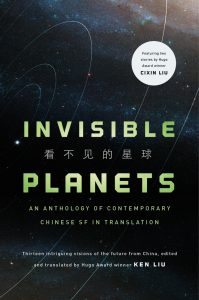
Invisible Planets: Contemporary Chinese Science Fiction in Translation ed., trans. by Ken Liu
Genre: Sci-Fi, Short Stories
Publisher: Tor Books on November 1, 2016
Source: Publisher
![]()
![]()
![]()
![]()
My thanks to the publisher for providing me with a digital review copy. No compensation was provided for this review, and all opinions are my own.
Award-winning translator and author Ken Liu presents a collection of short speculative fiction from China. View Spoiler »
![]()
![]()
![]()
This post is part of Sci-Fi Month 2016, a month long event to celebrate science fiction hosted by Rinn Reads and Over the Effing Rainbow. Follow along on Twitter via the official @SciFiMonth Twitter account, or with the hashtag #RRSciFiMonth.
The whole point of Sci-Fi Month has been to stretch myself and try new things, and I think it’s safe to say that goal has been met after finishing INVISIBLE PLANETS. This short fiction anthology collects some of the newest voices in Chinese science fiction, many of whom have never before been translated into English. I’ve been really curious about Chinese science fiction ever since Cixin Liu’s THE THREE BODY PROBLEM burst onto the English-language scene a few years ago, and I now feel like I have a much better grasp on it.
“China Dreams,” Ken Liu’s introduction to the anthology, warns readers away from a simplistic understanding of what exactly makes sci-fi Chinese. Just like China itself, the country’s sci-fi has a multiplicity of styles, themes, underlying concerns, and politics embedded within it. That said, reading the stories contained within this anthology has given me a greater understanding of the hopes and concerns that preoccupy young(er) sci-fi writers in China — and it’s also whet my appetite for further exploration of Chinese science fiction!
I enjoyed all of the stories in this anthology, but my favourites were unquestionably those written by Xia Jia. Beautifully written, with a touch of the fantastical, Jia’s stories transported me to worlds not quite our own. Spiritualism and religion play a large part in the three stories of hers included in the anthology, and I found myself captured by her portrayal of gods and monsters alike. Jia’s skill is hardly surprising — she’s the first person to hold a PhD in comparative literature focusing on Chinese science fiction. How cool is that?!
Very different in tone from Xia Jia’s work, Hao Jingfang’s stories “Invisible Planets” and “Folding Planets” were also among my favourites in the anthology. “Invisible Planets” is an ingenious story about the art of storytelling itself: the entire piece is narrated by someone telling their listener the story of many planets and the people who live on them. Do these planets really exist, and has the storyteller really visited them? Maybe that doesn’t matter as much as the telling. This story gave me chills with its incisive commentary on our tendency to pass judgement on cultures that we don’t understand. One line in particular stood out to me:
“Their histories play out on two time scales, each echoing the other. But they remain opaque to each other, unaware that when it comes to time, everyone is only measuring the universe using the ruler of their own lifespan.”
Short story anthologies can be tricky to pull off, and often there are at least one or two short stories that aren’t up to par — but that’s not the case with INVISIBLE PLANETS. Although I’ve only specifically addressed two authors (with five stories between them), that’s not because I don’t have anything to say about the others; in fact, it’s the opposite. I want you to have the opportunity to discover these stories for yourself. From hard sci-fi to a kind technological magical realism and everything in between, this anthology has something for every reader.
Complex and challenging, INVISIBLE PLANETS is a must-read for fans of the genre and anyone who wants to expand their reading horizons into territories previously unexplored. I know that I, for one, will be reflecting on this thought provoking read for a long time to come.